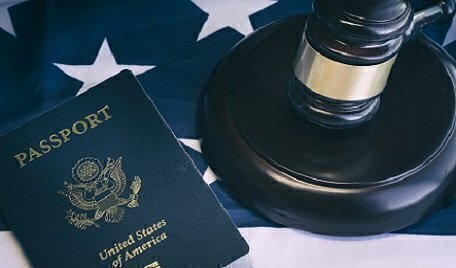Returning to the Supreme Court with a new appeal on immigration, the Trump Administration on Friday asked the Justices for unchecked power to bar entry to the United States of foreign nationals of six countries with Muslim-majority populations.
 This request, in a case from Hawaii, is the first of two that the government is expected to file. The second, in a case from Maryland, will not be made until a federal appeals court decides that case, which is expected soon.
This request, in a case from Hawaii, is the first of two that the government is expected to file. The second, in a case from Maryland, will not be made until a federal appeals court decides that case, which is expected soon.
At issue in both cases is the legality of President Trump’s third attempt to impose a sweeping restriction on entry of foreign nationals from the six designated countries as a move to deal with potential terrorist threats.
Although the President has been trying since his eighth day in office to impose restrictions on foreign nationals seeking to live or visit this country, the first two such efforts failed – for the most part – in lower courts. The Supreme Court at one point had agreed to hear the Administration’s appeal seeking to defend the second version, but that case, too, ended without a decision by the Justices.
The Court from time to time has eased the lower court’s orders against enforcement, but the Justices have never issued a direct ruling on whether the President has the authority – under his own constitutional powers or under powers handed him by Congress – to put such broad restrictions in place.
Getting such a direct decision, now that the third order has gone through lower court tests, is the aim of the Administration’s latest appeal. In that Hawaii lawsuit, the U.S. Court of Appeals for the Ninth Circuit ruled that the third order went beyond the President’s own constitutional authority and beyond immigration-control laws passed by Congress.
It is unclear whether the Supreme Court will speed up the normal schedule for review of this controversy, so that it could be heard and decided during the current Term, which is expected to run until late June. As of now, the first reply to the new appeal by the Hawaii challengers of the president’s executive order is not due at the Court until February 5. And the case from Maryland, of course, has not even reached the Justices yet.
While the Court has the option of putting the dispute on a fast track, the Administration actually has no real need for that because, in an order on December 4, the Justices allowed federal officials to put the restrictions fully into effect, and they are in place now.
While this version of the restrictions is aimed at eight countries, the challengers in both the Hawaii and Maryland cases sued to block the presidential order only as it applied to the six nations with majority populations of Muslims: Chad, Iran, Libya, Somalia, Syria and Yemen. The lawsuits did not contest the restrictions as to North Korea and to specific individuals in Venezuela, and those are no longer at issue in the cases.
The restrictions are not uniform in detail as to all six of the Muslim nations, but the limits they impose are intended to be permanent – unlike the temporary nature of the first two Trump orders.
In taking the Hawaii case to the Supreme Court, Administration lawyers argued that the Ninth Circuit Court’s decision, if allowed to stand, would raise “grave constitutional problems” dealing with separate tasks that the Constitution assigns to the three branches of the national government.
But, the document added, there is no need for the Court even to examine the scope of the President’s own constitutional authority, since, it argues, the Ninth Circuit Court was wrong in finding violations of immigration laws and federal court procedure law.
Beyond its point-by-point challenge to the Ninth Circuit Court’s ruling, the new appeal document urged the Court – as an initial matter – to declare that the third presidential order is not even subject to any challenge in the courts. (The Ninth Circuit Court ruled that it was open to challenge.)
Congress, the new filing contended, has made clear that the President may block entrants of foreign nationals any time the Chief Executive decides that is necessary to protect “national interests,” and has specified that such decisions cannot be challenged in the courts.
If the Justices were to agree on that basic point, the case would be ended without a ruling on whether the presidential order is legally or constitutionally valid. The order would remain in full effect.
The Administration appeal argued that, even if the Court were to uphold the Ninth Circuit Court’s order against enforcement of the third order, that bar to enforcement should be limited only to the individuals and entities that had sued, not the whole world, as the Circuit Court order encompasses.
While the Ninth Circuit Court said the full sweep of the third order could not be enforced around the world, it did allow the government to forbid entry to any foreign nationals from the six specified nations if those individuals at present had no family or institutional ties to the United States.
The Administration protested the Ninth Circuit’s order even as narrowed by that court, saying that the government would be forbidden to keep out of the country the vast majority of those seeking to travel to the U.S. to live or to engage here temporarily in business, education or tourism.







